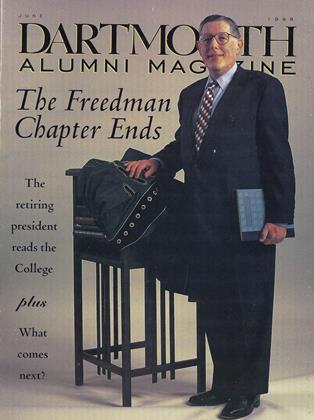A random walk through some of the names and titlesover the past 2,000 honorary degrees.
AS WE ALL LEARNED IN FIFTH GRADE, Dartmouth College was founded in 1769. Not so well known, perhaps, is the fact that four years later, in 1773, it "graduated six seniors and awarded its first honorary-degrees—all 19 of them. Six grad and 19 honoraries.
Whether it was the length of the citations or the desire to adjourn to the ox roast we don't know, but there was a decided cut-back (and a rather nicer ratio) the following year. In 1774 there were seven grads and four honoraries.
Honorary degrees back in those days as often as not had a mail-order aspect to them. "Dear Dartmouth: I'd like one of your honorary degrees. Enclosed is 50 bucks." There was a review board, of course, and it helped if you had accomplished something, but apparently if the price was right you had a good chance of making it to the platform.
That changed in time, and the majority of the some 2,000 honorary degrees awarded by Dartmouth over the past 224 years have been based on high merit.
A bit of random research reveals that two sitting U.S. Presidents have been honored, Eisenhower and Clinton. (It's a bit fuzzy concerning James Monroe in 1817, although in this century Woodrow Wilson, Hoover, and FDR received degrees before they assumed high office.)
Four chief justices have made it: Salmon P. Chase in 1855, Melville Fuller in 1901, Charles Hughes in 1923, and Harlan Stone in 1934. (William Rehnquist didn't, though he did visit Dartmouth in 1989. During his speech in Spaulding Auditorium, he held up what he said was a $ 10,000 bill, complete with Salmon P. Chase's face on it.)
Three men have received honorary degrees twice: Robert Frost 1896 in 1933 and 1955, Paul Sample '20 in 1936 and 1962, and Nelson Rockefeller '30 in 1957 and 1969. Only two brothers, as far as I can determine: in 1971 John '28 and Anthony Turkevich '37 were honored together. I can find only one father-son combination (newspaper publishers Arthur H. Sulzburger in 1951 and son
Arthur O. in 1964), and no grandsons and grandfathers.
Dartmouth admitted women in 1972 and didn't give an honorary degree to a woman until 50 years earlier: Vermont/Maine novelist Dorothy Canfield Fisher in 1922. The second was also a Dorothy, and not until 16 years later: journalist Dorothy Thompson in 1938.
The College's first black graduate was Edward Mitchell 182 8, but it was a half-century later before it bestowed an honorary M.A. in 1879 to an African American, James D. Burrus, who was a druggist. It was not until 1901 that it conferred an honorary doctorate on a black man, Booker T. Washington, the first principal of the Tuskegee Institute. Winfield S. Montgomery, an 1878 Phi Beta Kappa graduate from Dartmouth, a professor at Alcorn University, and a Washington, D.C., school principal for 42 years, got a doctorate. Soprano Leontyne Price got one in 1962.
I believe the first Native American to get an honorary was Frell Owl '27 in 1969.
The first husband and wife were the actors Alfred Lunt and Lynn Fontanne in 1954. They were followed by Lord and Lady Dartmouth in 1969, Melvyn and Helen Gahagan Douglas in 1977, and the Solzhenitsyns in 1991. Dartmouth presidents and their wives— the Dickeys, Kemenys, and McLaughlins—have also received dual honoraries.
Locally, in recent times, Dartmouth has honored Hanover elementary school teacher Marilyn "Willie" Black in 1980; Baker librarian Virginia Close and Lou's restaurateur Lewis Bressett received honorary masters in 1986.
The New York Times has had a bundle of honorees and TheNew Yorker a handful. No one can top The New Yorker's incomparable E.B. White, who wrote to his wife after dinner the night before Commencement, "I filled up immediately with gas and apprehension" and was therefore too ill to attend the president's reception.
FRITZ HIER, secretary for the class 0f 1944, ran Commencement ceremonies for 17 years as director of Dartmouth's office of publicprograms. He wrote last month's profile of Dick Scheaff '66.
 View Full Issue
View Full Issue
More From This Issue
-
 Cover Story
Cover StoryThe Education of a President
June 1998 -
 Feature
FeatureWhat Comes NEXT
June 1998 By Charles Wheelan ’88 -
 Article
ArticleThe Gospel According to Odysseus
June 1998 By Professor William Scott -
 Article
ArticleBack to the Future
June 1998 By James O. Freedman -
 Article
ArticleNewt ana Other Spring Speakers
June 1998 By "E. Wheelock" -
 Class Notes
Class Notes1974
June 1998 By Don Casey Jr.
Fritz Hier '44
-
 Letters to the Editor
Letters to the EditorLetters to the Editor
September 1978 -
 Letters to the Editor
Letters to the EditorLETTERS
MAY 1990 -
 Letters to the Editor
Letters to the EditorA Full Disabled Life
October 1995 -
 Article
ArticleNAME, RANK, AND SERIAL NUMBER.
DECEMBER 1969 By FRITZ HIER '44 -
 Books
BooksTHE CATCH AND THE FEAST.
JANUARY 1970 By FRITZ HIER '44 -
 Feature
FeatureScions Of The Times
OCTOBER 1988 By Fritz Hier '44
Features
-
 Feature
FeatureDartmouth's Ongoing Purpose
April 1962 -
 Feature
FeaturePress Secretary
OCTOBER 1966 -
 Feature
FeatureWhat Is Success?
MARCH 1983 By E. R. (Skip) Sturman '70 -
 Feature
FeatureMagic Mountain
December 1976 By H.B. WAUGH JR. -
 Feature
FeatureNotebook
Jan/Feb 2013 By JAMES KEGLEY -
 Feature
FeatureEven Shoes Are Back
DECEMBER 1981 By Nancy Wasserman '77


